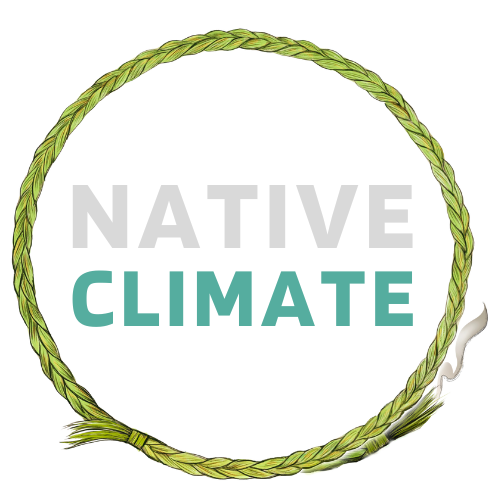
Select Page
CMIP6 data presented at our All Climate is Local workshop on changing temperatures, precipitation levels, and wind speeds paint a clear picture of a warming climate. However, statistics alone can’t show the whole story. Native Climate wants to hear more about direct impacts in your communities (such as floods, heatwaves, drought, wildfires, high winds, wildlife changes, air quality) and your responses to them.
To facilitate this knowledge sharing, Native Climate funded students from Tribal colleges and universities (TCUs) research and create stories about specific climate impacts in their communities and show examples of how the people and the land are adapting to these stressors. The project encouraged diverse approaches to this subject, incorporating stories in diverse forms (oral, music, written, visual arts, etc.).
The short videos below feature students discussing their projects and the relationship to local climate issues.
Tohono O’odham Community College student Seanna Albert discusses agricultural resilience on the Hopi Mesas through dry farming and natural spring irrigation.
Salish Kootenai College graduate student in Natural Resource Management MaryRose Morigeau discusses plans for culturally-informed ecosystem restoration of an old post and pole saw mill along the Flathead River.
Salish Kootenai College student Amber Hamm shares her artwork depicting the changing seasons on the Flathead Reservation.
Tohono O’Odham Community College Student Rochelle Charette discusses the biocultural restoration of wild rice in the Great Lakes region.
San Carlos Apache College student Marcus Altaha introduces his short film about how we can use teachings of our Ancestors to combat climate change.
Salish Kootenai College student Cherish Grassrope discusses recent climate initiatives on the Flathead Reservation.
Tohono O’Odham Community College and University of Arizona student Dani Kouyoumdjian delivers an essay on a return to local Indigenous foodways as a means of reinforcing Tribal sovereignty.
Tohono O’Odham Community College Student Derrick Gonzales presents a portfolio of illustrations meant to inspire youth to embrace environmental conservation.
San Carlos Apache College student Jennifer Grisenti reads her short story about the importance of Cottonwood Trees to life on the San Carlos Apache Reservation.
Salish Kootenai College student Sarah Sandoval discusses her short film “Voices of the Elders”, which was inspired by interviews she did with Salish and Kalispel elders about climate change impacts on the Flathead Reservation.
San Carlos Apache College student Jennifer Grisenti tells the story of the Hummingbird and the Road Runner, illustrated by her nephew Lawrence N. Macktima.
College of the Muskogee Nation student Aiyanna Tanyan uses visual art to discuss the impacts of drought on Mvskoke people.
Fond du Lac Tribal & Community College students Tyler Selin and Precious Tibbetts discuss how climate change is impacting the health of Minnesota Moose (Mooz) and white-tail deer (waawaashkeshi).
Salish Kootenai College graduate student Sarah Holloway shares her pyrography (wood burning) project showing ambassador species on the Flathead Reservation and discussing how they are being impacted by climate change.
Salish Kootenai College student Ron Britt talks about fishing and the changes he has seen on the Flathead Reservation.
San Carlos Apache College student Jennifer Grisenti shares her research on the Arizona Poppy, and what it is telling us about the shifting seasons on the San Carlos Apache Reservation.
Salish Kootenai College student Nicholas Grant shares a playing card game he created to teach people about climate hazards on the Flathead Reservation.
Blackfeet Community College students Loren Racine and Tamara Gopher share how gatherers of traditional plants on the Blackfeet Reservation are bearing witness to climate change, and the mitigation actions being undertaken to preserve native ecosystems.
Tohono O’odham Community College student Alexis Dutro discusses the importance of safe, high-quality water resources to communities in the Southwest.
Shantel Chee, a student at the Institute of American Indian Art, presents on the importance of wild parsley and explains how climate change has impacted its growth.
Randall Finley, a student at Salish Kootenai College, compares georeferenced photos from the 1980s to ones from the present day to understand changing tree cover on the Flathead Reservation.
Tohono O’Odham Community College Student Derrick Gonzales presents a graphic novel depicting the impacts of drought on the Tohono O’odham Reservation.
Gina Graham, student at Salish Kootenai College, speaks about the impacts of climate change on the Colville Indian Reservation.
Salish Kootenai College student Joni Tobacco shares how climate change is affecting the availability of traditional plants on the Pine Ridge Reservation.
The following document provides important information on how to incorporate the CMIP6 dataset into your All Climate is Local project, as well as details on project meetings and deadlines. Click the button below to download, or view the PDF below.
Native Climate is made possible with support from USDA-NIFA Climate Programs under grant number 2022-68015-36357. Native Climate builds on the work of other NIFA-funded projects, including: